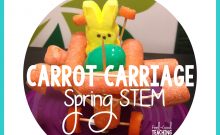How gritty are your students? Do they love a challenge, or do they wilt in the face of difficulty?
How much does grit matter to their success and achievement over a lifetime? Unsurprisingly, grit matters quite a lot! I think we know this as teachers, but finding ways to help students build up their stamina when faced with difficulties can prove tricky. But it might be the single most important thing we can do for our students. I’ve got a couple of tips for you today.
I’ve been reading the book, Grit: The Power of Passion and Perseverance. (That’s an affiliate link, but I picked it up at the library.) I’m about halfway through now, and I highly recommend this book for all teachers and parents!
Early in the book, the author discusses the surprising advantage of struggling to learn. She wonders if talented students learn the same lessons of perseverance of those that struggle and keep at it:
Do they discover that the capacity to do something over and over again, to struggle, to have patience, can be mastered — but not overnight? Some might. But those who struggle early may learn it better.
For awhile now, I’ve suggested that introducing students to failure — and how to respond to it to reap all its advantages — early and often is one of our key responsibilities as mentors to children. This is especially crucial for our gifted students and over-achievers. It doesn’t serve them well to have no run-ins with failure until adulthood.
OK, we get it … How do we help kids develop grit?
If we want students to not only develop grit, but to learn to love a challenge, we must give them many experiences with failure and recovery. They must be challenged, be allowed to fail, and have the time to analyze the defeat and create a new plan. Then, we must allow to test their new ideas. We must give them the space and time. They must feel our support and our confidence in their abilities to recover. We must not make things too easy. We must not give them the answers.
So, you probably saw this coming — STEM Challenges, y’all! Seriously, they are perfect little microcosms of life packed into a discreet amount of time:
- Students get a problem.
- Students try to solve a problem.
- Students struggle (if you’ve appropriately challenged them).
- Students solve the problem to varying degrees of success or failure.
- Students analyze, regroup, and try again.
Some students may get these experiences on a regular basis in certain academics. Some do not. You can mastermind it so that many — or even all — experience it with STEM Challenges because you control the criteria and constraints.
The two most important things are to not make it too easy and to have a plan in place to guide students through failures. If you struggle with the latter, check out Failtober. There is a month’s worth of live sessions and posts to help you help your kids develop grit!
But you know I’m not going to leave you empty handed. Check out the Flower Frenzy STEM Challenge freebie below. This is a set of four mini challenges in the paperless version, compatible with Google Slides(TM). You’ll get Floating Flowers, Functional Flowers, Fluff & Flatten Flowers, and Firmly Fixed Flowers for free!
We want students to rise to the challenges they encounter in life. Above that, we want them to learn to LOVE challenges. They always bring growth and opportunities when we allow them to!
Check out these other great ideas to spark a love of learning in your upper elementary students!
From left to right:
Spark a Love of Learning with Games | The Owl Teacher
Spark a Love of Social Studies | Tried and True Teaching Tools
3 Ways to Inspire a Love of Fractions | Mix and Math
Just-Right Reading: I Love Myself! | Reading by Heart
5 Ways to Ignite a Love of Math Problem Solving | Think Grow Giggle
Absent Work that Students and Teachers Love | Elementary Inquiry
Loving to Write Informational Texts | Mikey D Teach
Valuing Student Voice to Create a Love of Learning | Wild Child’s Mossy Oak Musings
Developing Grit: Learning to Love a Challenge | Kerry Tracy
How to Inspire a Love of Geometry | Love Learning













